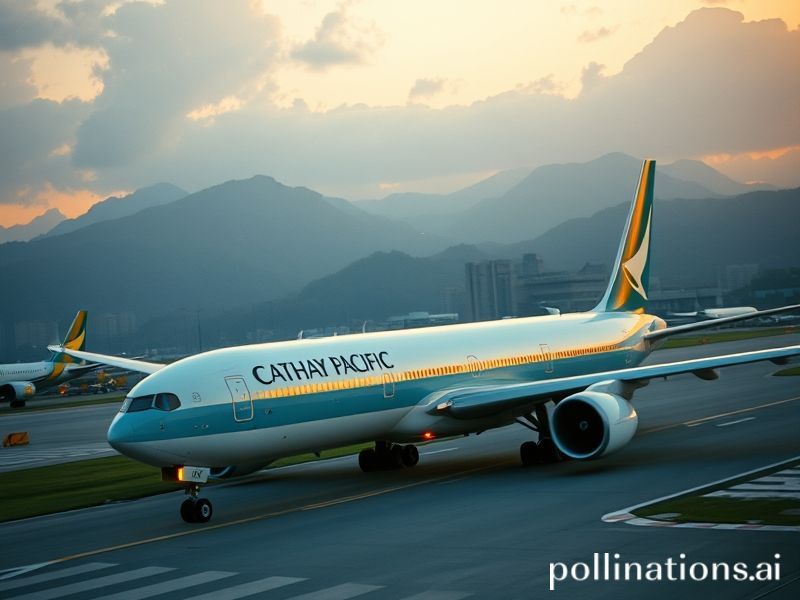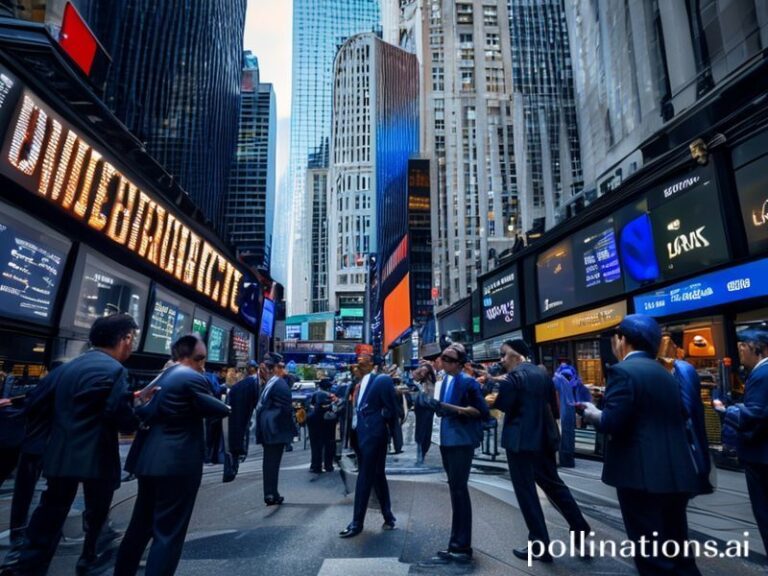Cathay Pacific: The Airline Caught Between Superpowers, Spreadsheets, and the End of History
Cathay Pacific Flies Straight Into the Turbulence of a Multipolar World
By our correspondent in the airport lounge where optimism goes to die
Hong Kong—On paper, Cathay Pacific is just another airline trying to coax human cargo into ever-smaller seats while its accountants figure out how to charge for oxygen. In practice, the 77-year-old carrier has become a geopolitical weather vane: whichever way its tailfin tilts, you can usually read the prevailing winds between Beijing, Washington, and whatever bunker European regulators are hiding in this week.
The airline’s latest earnings call—delivered with the forced cheer of a flight attendant explaining why the chicken is now “plant-forward”—revealed a HK$5.5 billion profit for 2023, a pleasant surprise after the pandemic years when its planes were as empty as a crypto exchange’s vault. Yet the numbers came wrapped in warnings about “overflight restrictions,” “crew visa delays,” and the evergreen favorite, “geopolitical tensions,” which is corporate speak for “the superpowers are bickering again, please keep your seatbelts fastened.”
Let’s zoom out. Cathay’s network map used to resemble a teenager’s bedroom wall: dreamy strings connecting Hong Kong to London, New York, Mumbai, Sydney—an atlas of globalization’s golden age. Today those same threads look more like a hostage negotiation diagram. Russian airspace? Closed to most Western carriers, wide open to Cathay—so long as it doesn’t carry too many Americans who might tweet something undiplomatic. Meanwhile, Chinese carriers are muscling into Heathrow slots once monopolized by the Swire Group’s pride and joy, turning the North Atlantic into a low-margin karaoke bar where everyone sings the same patriotic ballads.
The airline’s predicament is a neat parable for the wider world. In the 1990s we were promised the end of history; in 2024 we get the end of direct routes. Every detour around closed airspace burns extra jet fuel, which is currently priced somewhere between saffron and printer ink. Cathay’s hedging desk—staffed, one assumes, by ex-BlackJack dealers with nerves of depleted uranium—has locked in oil at levels that looked prudent six months ago and now feel like paying for champagne in a dive bar. Passengers, naturally, will absorb the difference via “carrier-imposed surcharges,” a euphemism so elastic it could cover everything from Ukrainian wheat futures to the CEO’s therapy bills.
Then there is the human element. Cathay spent much of 2020-21 marooned in reputational purgatory after some crew members dared to voice sympathy for Hong Kong’s democracy movement. Beijing’s response was swift: new security laws, loyalty oaths, and the quiet retirement of executives who discovered that “free speech” is an in-flight item now permanently out of stock. The result is an airline whose cabin announcements sound like they’ve been vetted by a focus group of paranoid apparatchiks—which, to be fair, they probably have.
Still, you have to admire the choreography. Last month Cathay unveiled a refreshed brand identity featuring brush-stroke calligraphy meant to evoke “timeless Asian warmth.” Critics noted it also evokes the timeless Asian habit of smiling politely while calculating your social-credit score. The new uniforms, unveiled in a blaze of LED lights and forced enthusiasm, come in colors described as “ember red” and “arctic dawn”—perfect for the moment when the plane is stuck on the tarmac for four hours and dawn begins to feel like a hostage situation.
Globally, the carrier’s survival matters more than it should. Hong Kong’s airport handles a third of the world’s air cargo; if Cathay stumbles, supply chains from Frankfurt chip fabs to Kansas cattle ranches wobble. That makes the airline less a business than a piece of critical infrastructure wearing lipstick. The same could be said for several sovereign nations, but at least Cathay offers complimentary peanuts.
As this correspondent watched a CX flight push back for London—its belly full of iPhones, its cockpit full of existential dread—I recalled the old aviation adage: airlines are the only enterprises that burn money faster than governments and still insist on serving dessert. Cathay Pacific, caught between empires and spreadsheets, continues to serve both. Fasten your seatbelts, dear readers; the seatbelt sign is now just another warning light on the dashboard of late-stage capitalism.







